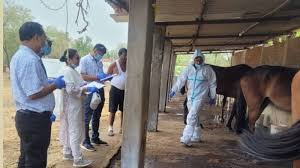Madhya Pradesh Launches Probe Into Death of Elite Racehorses Transported From Hyderabad
In a development that has triggered outrage among animal welfare groups and heritage breed conservationists, the Madhya Pradesh government has initiated an official investigation into the suspicious deaths of eight high-value racehorses, which were part of a larger group of elite equines recently moved from Hyderabad to Raipura village in the Jabalpur district.
These horses, including rare and prestigious breeds such as Marwari and Thoroughbred, reportedly died shortly after being transferred to a private farm under questionable conditions.
Probe Ordered Amid Serious Allegations
The investigation was ordered by Jabalpur District Collector Deepak Saxena, following media reports and veterinary department alerts about the deaths.
Initial inputs suggest that a total of 57 horses were shifted from Hyderabad to Madhya Pradesh between April 29 and May 3—allegedly without the legally mandated veterinary documentation or clearance certificates.
According to sources within the administration, the movement of these horses appears to have been facilitated by Sachin Tiwari, a local resident with ties to a Hyderabad-based businessman who is now under scrutiny.
Authorities are trying to verify whether this cross-state animal transfer was conducted in violation of animal transport laws and quarantine regulations.
Breeds Involved and Their Significance
Among the horses were Marwaris, a breed native to Rajasthan, instantly recognizable due to their distinctively curved inward-pointing ears and highly regarded for their resilience, temperament, and ability to navigate tough terrain.
Also included were Thoroughbreds, an internationally celebrated breed known for its speed, athleticism, and dominant role in the horse racing industry. These breeds are sometimes crossbred to create larger, more versatile equines suited for both endurance and speed.
Officials said that some of the deceased horses were from this valuable genetic stock, deepening concerns over the loss of heritage breed specimens and raising red flags about possible negligence or mistreatment during their journey and subsequent care.
Veterinary Teams and Preliminary Findings
Prafulla Moon, the Deputy Director of the State Veterinary Department, confirmed that four separate investigative and medical teams were deployed to assess the situation once the horses were traced to the Raipura farm.
The teams discovered that the animals had suffered from extreme heat stress, having been transported during high temperatures in poorly ventilated and overcrowded trucks.
“The transport occurred under harsh climatic conditions. Upon arrival, the horses exhibited symptoms of stress-related illness. As of now, eight horses have died, and we have sent blood samples from all 57 horses to a laboratory in Haryana,” Moon stated.
He added that test results for 44 horses had already come back, confirming that no contagious diseases were detected. However, the focus has now shifted to animal welfare violations, especially regarding the living conditions at the facility.
Cramped and Unsuitable Shelter Conditions
Officials found that the horses were being housed in a cramped cattle shed, lacking adequate shade, ventilation, and space for movement.
The farm also appeared ill-equipped to meet the basic care needs of such high-maintenance animals, especially given the ongoing heatwave conditions in the region.
The inadequacy of the shelter, combined with the stress of long-distance travel, is believed to be a major contributor to the animals’ deaths. Following these revelations, animal rights groups quickly mobilized to ensure immediate intervention.
Legal Action and PIL Filed in High Court
The deteriorating situation led to the filing of a Public Interest Litigation (PIL) before the Madhya Pradesh High Court by Jabalpur-based animal rights activist Simran Issar, represented by her legal counsel, Umesh Tripathi.
The PIL seeks urgent judicial intervention to protect the 49 horses that remain alive at the facility.
In the petition, the activist describes the surviving horses being kept in open fields without adequate protection from the sun, and facing a lack of clean water, proper food, medical attention, or sanitation facilities.
Moreover, the petition levels serious allegations against one of the respondents—a prominent Hyderabad-based businessman, who is described as the “mastermind” behind an elaborate and possibly illegal online horse racing operation, allegedly broadcast in the Philippines via a mobile application.
Shocking Allegations of Neglect and Betting Operations
According to the PIL, the online horse racing operation allegedly involved as many as 154 horses, and races were conducted 24 times a day, with heavy emphasis on foreign online betting markets.
The petition also claims that after salaries were withheld from the farm staff, the horses were left without adequate food and water.
“In February 2025, only 64 out of the original 154 horses were still alive,” the petition states. “Subsequently, these surviving horses were transported to Jabalpur under the control of Sachin Tiwari.”
This move, allegedly carried out without the oversight of state animal welfare boards or appropriate veterinary checks, has prompted calls for a thorough investigation into the interstate transfer of animals, their care, and the legality of the broader horse racing enterprise allegedly linked to betting.
Next Steps and Public Outcry
In the wake of widespread media coverage and public outrage, the National Horse Breeding Society of India attempted to send a consignment of medical supplies to assist the ailing horses.
However, reports suggest that Sachin Tiwari prevented the truck from entering the premises, further escalating the situation.
The High Court is expected to take up the PIL in the coming days, with animal welfare organizations across India watching the case closely as it may set a precedent regarding the transportation, treatment, and legal protection of heritage and racing horses in India.
The Madhya Pradesh administration has assured that no negligence will be tolerated, and strict legal action will be taken if violations of animal protection and transport laws are confirmed through the ongoing investigation.

